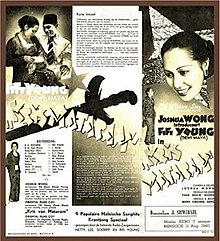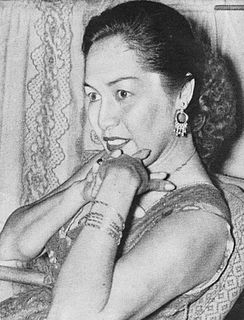
Fifi Young was an Indonesian actress of mixed French and Chinese descent who acted in at least 86 films over her 34-year career.

Njoo Cheong Seng was a Chinese-Indonesian playwright and film director. Also known by the pen name Monsieur d'Amour, he wrote more than 200 short stories, novels, poems and stage plays during his career; he is also recorded as directing and/or writing eleven films. He married four times during his life and spent several years travelling throughout southeast and south Asia with different theatre troupes. His stage plays are credited with revitalising theatre in the Indies.

Rentjong Atjeh is a 1940 action film from the Dutch East Indies directed by The Teng Chun. Telling of a group who take revenge against pirates in the Strait of Malacca, it starred Ferry Kock, Dewi Mada, Bissoe, Mohammad Mochtar, and Hadidjah. It was filmed near the shore in Batavia and reused footage from The's earlier work Alang-Alang (1939). Rentjong Atjeh, inspired in part by the Tarzan films, was a commercial success, although it may now be lost.
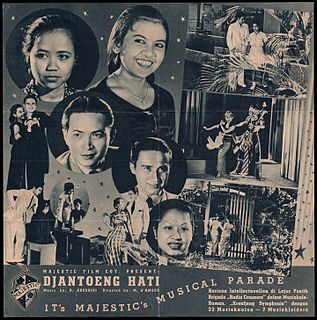
Djantoeng Hati is a 1941 film from the Dutch East Indies directed by Njoo Cheong Seng. A tragedy warning against modernity, it starred A Sarosa, Rr Anggraini, and Ariati
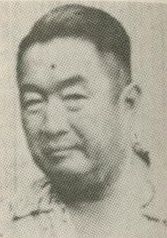
Fred Young was an ethnic Chinese film director and producer active in the Dutch East Indies and its successor state, Indonesia. He reportedly studied film in Hollywood as a youth, but only entered the nation's film industry in 1940. After he made his debut as a writer with Sorga Palsoe, he was involved in some 36 productions, 23 as director.
Boenga Roos dari Tjikembang is a 1931 film from the Dutch East Indies directed, produced, and filmed by The Teng Chun. Based on a 1927 novel of the same name, it follows the complicated romantic situations of two generations of ethnic Chinese in the Indies. An early example of domestic sound films, the film was remade in 1975.

Astaman was an Indonesian actor active from the 1910s until the mid-1970s. He was a leading actor in the influential theatre company Dardanella and, after entering the film industry with 1940s Kartinah, acted in 43 films.

Zoebaida is a 1940 film from the Dutch East Indies directed by Njoo Cheong Seng. A romance set in Timor, it starred Njoo's wife Fifi Young and was the film debut of Soerip. Shot over a period of 27 days in a Dutch-owned studio, the film received middling reviews. It is likely lost.
Si Ronda is a 1930 silent film from the Dutch East Indies which was directed by Lie Tek Swie and starred Bachtiar Effendi. Based on contemporary Betawi oral tradition, it follows the exploits of a bandit, skilled in silat, known as Si Ronda. In the lenong stories from which the film was derived, Ronda was often depicted as a Robin Hood type of figure. The production, now thought lost, was one of a series of martial arts films released between 1929 and 1931. Si Ronda received little coverage in the media upon its release. A second adaptation of the tale, Si Ronda Macan Betawi, was made in 1978.

Air Mata Iboe is a 1941 film from the Dutch East Indies directed and written by Njoo Cheong Seng. Starring Fifi Young, Rd Ismail, Ali Sarosa, and Ali Joego, it followed a mother who raises her children lovingly but is ultimately betrayed by her eldest sons when she falls upon hard times. The film, billed as a "musical extravaganza," featured a soundtrack by R. Koesbini, and an eponymous title song written by Njoo.

Panggilan Darah is a 1941 film from the Dutch East Indies written and directed by Sutan Usman Karim and produced by Tjho Seng Han for Oriental Film. The black-and-white film starred Dhalia and Soerip as orphaned sisters trying to make a living in the colonial capital of Batavia before moving to Kudus to work at a clove cigarette factory.

Bengawan Solo is a now-lost 1949 film from what is now Indonesia. Directed by Jo An Djan, it starred Sofia WD, Rd Mochtar, and Mohamad Mochtar.
Njai Dasima is a 1932 film from the Dutch East Indies which was directed by Bachtiar Effendi for Tan's Film. It was the second film adapted from G. Francis' 1896 novel Tjerita Njai Dasima, following a silent version in 1929. Starring Momo and Oesman, it followed a young Sundanese njai (concubine) who is tricked into marrying a man who does not love her and ultimately killed for her money. The film, the first talkie produced by its company, was also the first directed by a native Indonesian. The now-lost work received mixed critical reception.

Dhalia was an Indonesian actress active for over fifty years. She was nominated for three Citra Awards at the Indonesian Film Festival, winning one.

Soerip was an Indonesian singer and film actress.

Pantjawarna is a 1941 film from the Dutch East Indies.

Waldemar Caerel Hunter, best known by his stage name S. Waldy, was an Indonesian stage and film actor.

Oriental Film was a film production company in Batavia, Dutch East Indies. Established by ethnic Chinese businessman Tjo Seng Han in 1940, it completed four black-and-white films before it was closed in 1941. All the company's films were screened into the 1950s but may now be lost. They were directed by two men, Njoo Cheong Seng and Sutan Usman Karim, and launched the careers of actors such as Dhalia and Soerip.
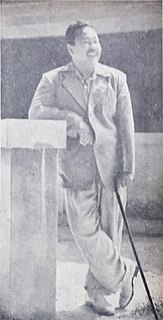
S. Poniman was an Indonesian kroncong singer and comic actor. Born in Banda Aceh in 1910, he took up singing and made his way to Batavia. In 1940 he made his debut as music director and actor on the film Kedok Ketawa, completing three further productions before the Japanese occupation brought film production to a near-standstill. Poniman spent time as a soldier and truck driver before returning to the film industry in 1951, after Indonesia's independence, as a star of Dunia Gila. Between 1951 and 1958 he appeared in more than twenty films before leaving the struggling industry to become a trader. Though he appeared in several further films before his death, Poniman never regained his stardom.
